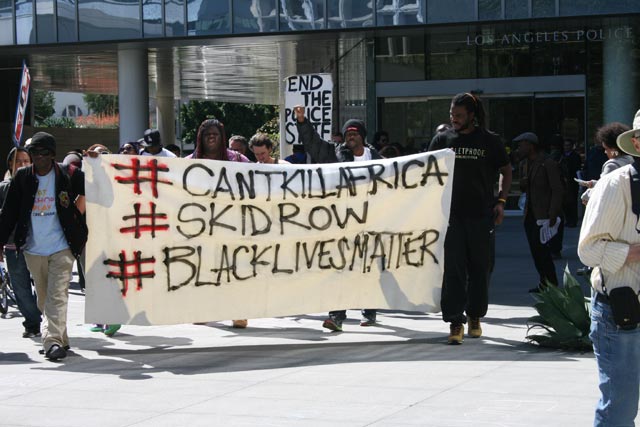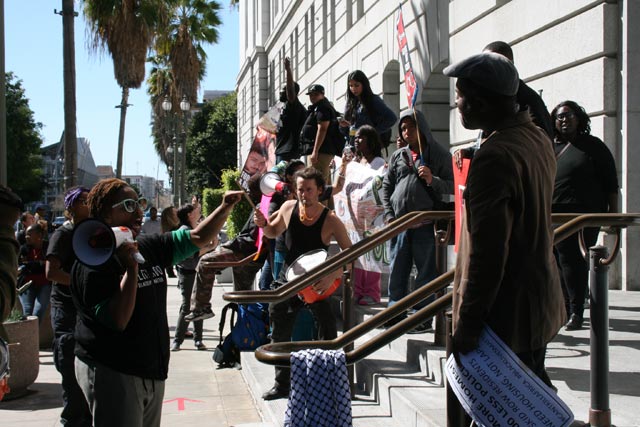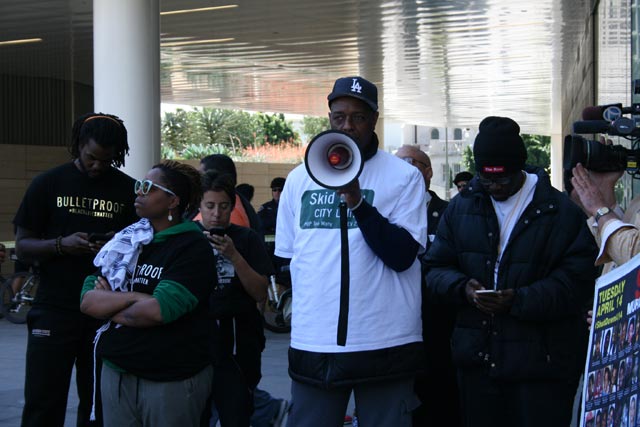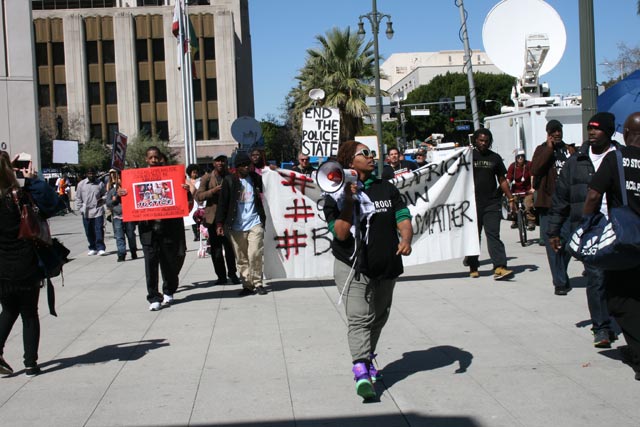
Honest, paywall-free news is rare. Please support our boldly independent journalism with a donation of any size.
Roughly 200 protesters gathered in front of the Los Angeles Police headquarters downtown at least twice last week, demanding justice for a mentally ill homeless man who was shot to death by LAPD officers March 1 in a videotaped killing that went viral.
The video, which has been viewed millions of times, shows Charley Keunang, who was known to his fellow skid row residents as “Africa,” because he was from the West African nation of Cameroon, being subdued on the ground by multiple officers and tased. Three officers then opened fire on him, leaving him motionless.
The shooting, along with the recent release of a scathing Department of Justice report on racism by the Ferguson Police Department, have amplified even further the national spotlight on racial bias and violence in American policing. The shooting also calls attention to systemic violence inflicted on vulnerable populations like the homeless and mentally ill.
Patrisse Cullors-Brignac, a cofounder of the Black Lives Matter movement, pointed out that Africa had a number of features that put him at risk.
“Charley was a black immigrant from Cameroon who suffered from mental illness and also had a criminal record on skid row, one of the most policed and occupied neighborhoods in the nation,” she told Truthout. “The skid row community constantly faces harassment, terror – and skid row is purposefully being occupied by the LAPD versus putting services there and prioritizing the real life needs of someone like Charley.”
 Black Lives Matter co-founder Patrisse Cullors-Brignac rallies protesters outside LA City Hall as protesters demand meeting with LA Mayor Eric Garcetti about the LAPD shooting death of Africa. (Photo: Bethania Markus)
Black Lives Matter co-founder Patrisse Cullors-Brignac rallies protesters outside LA City Hall as protesters demand meeting with LA Mayor Eric Garcetti about the LAPD shooting death of Africa. (Photo: Bethania Markus)
SMART Team Requested
Residents have been asking the LAPD to place a dedicated emergency mental health response or Systemwide Mental Assessment Response Team (SMART) in skid row, but so far the department has responded that they don’t have the funding, a skid row community leader known as General Jeff, told Truthout.
“The majority of the (skid row) population suffers from mental illness, and LAPD is out of their league,” he said. “A SMART team should have been there on site (when officers responded to Africa).” Other on-the-ground activists on skid row also want the SMART team to respond. The SMART team is comprised of a plain clothes officer and a mental health professional.
General Dogon, a community organizer with the LA Community Action Network (LA CAN), said the SMART team has yet to respond to a mental health emergency call in skid row.
“The LAPD claims [uniformed officers] have this 36-hour training on dealing with folks with disabilities, but for residents it’s like a nightmare,” he said. “The LAPD gets 57 percent of the city budget. They need to switch some priorities around, especially when you’re shooting unarmed people.”
The LAPD did not respond to a request for comment for this story.
Chanting slogans like “They think it’s a game; they think it’s a joke,” and “You can’t kill Africa,” the crowd of protesters rallied outside a Los Angeles Police Commission hearing on Tuesday for about an hour and a half, then marched to LA City Hall, where they demanded a meeting with Mayor Eric Garcetti.
General Jeff said the mayor’s staffers asked that protesters fill out an official request for an in-person meeting.
“We’ll give them time to respond to our official request,” he said. If their request isn’t granted, skid row and Black Lives Matter activists agreed to take their protest to the mayor’s house.
 Patrisse Cullors-Brignac and skid row community leader General Jeff speak outside an LA Police Commission hearing on Tuesday, March 3. (Photo: Bethania Markus)
Patrisse Cullors-Brignac and skid row community leader General Jeff speak outside an LA Police Commission hearing on Tuesday, March 3. (Photo: Bethania Markus)
Real Death Toll Far Higher Than Official Count
Because there is currently no official national database of police killings in the United States, it has been nearly impossible to analyze the factors influencing fatal encounters involving police officers with precision – and thus, it has been difficult to come up with policy solutions, said D. Brian Burghart, a Reno, Nevada-based journalist who launched his own national database, Fatal Encounters, to fill the hole of information.
By collecting data from media reports, Burghart said it appears mental illness may contribute to roughly 30 percent of police killings, while black people are, of course, grossly overrepresented in the death toll numbers.
Because Burghart’s data comes primarily from media reports, however, accurate information isn’t always easy to find, and circumstances surrounding the killings are often murky. That’s why a standardized database is sorely needed.
“Even when we try and track it, the reason the police responded is so infrequently reported,” he said. “It’s hard to make any clear declarative statement.”
According to Fatal Encounters data, in many instances, the race of the victim is not reported by the media, but statistics still show that between the year 2000 and the present date, at least 1,101 of the 5,147 people killed by police have been black, accounting for at least 21 percent of killings, while blacks account for only 13 percent of the American population. Whites accounted for 1,540 deaths or 30 percent, but make up 72 percent of the American population, according to US Census 2010 data. In 1,658 cases, the race of the person killed was not reported and couldn’t be logged in the Fatal Encounters database.
According to the FBI’s statistics for police killings, categorized as “justifiable homicide,” only 461 cases were logged in 2013, the most recent year available. But Fatal Encounters logged 1,010 deaths of civilians by police.
“You can see the FBI’s numbers are wildly inaccurate,” Burghart said. “That number 1,010 (for 2013) will only go up from there. We don’t have any declaration that 2013 is complete. We’re certain we’re missing some, and the thing about crowd sourcing is it only grows from where it’s at.”
In December, Congress reauthorized the Death in Custody Reporting Act, which requires states that receive federal law enforcement funding to report all deaths of people detained, arrested, en route to incarceration or incarcerated to the federal government. The law was in effect from 2000 to 2006.
Burghart, however, is not optimistic that the reauthorized law will have much impact. He pledges to continue compiling his own data.
“We could look at prior to 2000 and see the data was no more accurate during the time the law was in effect,” he said. “The question is whether the next attorney general will enforce the law.”
 Protesters march on Tuesday, March 3, demanding justice for Africa, a homeless skid row resident who was killed by LA police on March 1. (Photo: Bethania Markus)
Protesters march on Tuesday, March 3, demanding justice for Africa, a homeless skid row resident who was killed by LA police on March 1. (Photo: Bethania Markus)
Skid Row Community Still Traumatized
A memorial with flowers, messages of love and loss and a cross now stand on the spot Africa was killed, near the intersection of 6th and San Pedro in skid row, and another protest was held Saturday outside LAPD headquarters.
General Jeff pointed out that no mental health resources have been offered to help the community cope with the trauma of Africa’s sudden, violent death.
“There’s no trauma teams that have been assigned to help the skid row residents cope with this tragic murder that people witnessed right in front of their eyes,” he said. “There’s a lot of trauma, but people are still trying to survive as we do on a daily basis on skid row, and LAPD is still arresting people.”
On Tuesday, protesters expressed both outrage and fatigue that the killings keep happening, with no end in sight.
“Everyone has to be accountable for what they do. If I kill someone, I’m going to jail. These police need to be called out on their actions,” said Brandy Brown, 24, an activist with the Youth Justice Coalition in Los Angeles. “It’s not right that they can take somebody’s life and still cash their check at the end of the day.”
Brown emphasized, above all, the pressing need for sweeping changes.
“I just feel like we need to stop, because we cannot keep living this way, and I cannot raise my kids up in this kind of corrupt world.”
Media that fights fascism
Truthout is funded almost entirely by readers — that’s why we can speak truth to power and cut against the mainstream narrative. But independent journalists at Truthout face mounting political repression under Trump.
We rely on your support to survive McCarthyist censorship. Please make a tax-deductible one-time or monthly donation.